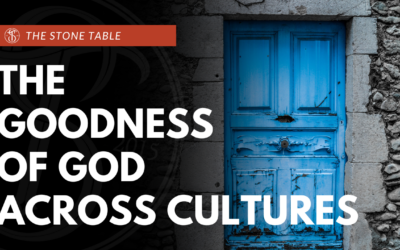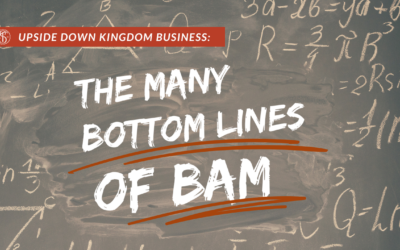Do you remember way back in 2017 when the most controversial thing on the internet was the picture of a dress? To this day, it’s a color-phenomenon simply referred to as “the dress,” where different people looked at the exact same picture and saw two completely different images.
Some clearly – adamantly – saw a gold dress with white stripes, while others – sitting in the same room looking at the same screen – passionately argued that the dress was black with blue stripes. Scientists have tried to explain it, but the more I read the more confused I get (something about ROY G BIV and the impact of sunlight on color, but science was my worst subject in high school).
But the sociological point isn’t lost on me: it is possible for two humans to look at the exact same thing and see something completely different. How can that be? How can we rally around truth when the simplest of objective exercises (look at this picture and tell me what’s there) turns into months of passionate debate? It’s exhausting.
Disagreement Isn’t Bad
Humans have always disagreed. Disagreement in itself isn’t bad. In fact, history is full of healthy debate.
The word “University” actually originates from the idea of finding unity in our diversity. Academia was built on forming and articulating arguments and allowing them to collide in the public square. The best medical breakthroughs are only accepted after being poked and prodded, heavily challenged, and ultimately peer reviewed. Jewish scholars don’t just see debate as a way of unearthing the truth, but the argument itself – exhausting every possible angle and position on an issue – as a form of truth itself. Unearthing the best way forward through complex and multilayered issues usually comes through a highly passionate polemic.
Then came social media. As my friend Rob Hoskins tongue-in-cheek tweeted recently:
“Hey I’ve got an idea: Let’s create a place where people with drastically different views on very complex issues that they are deeply passionate about, have 140 characters to make a salient argument – what could go wrong?”
Social media has completely transformed human social interaction. What started as a fun way to reconnect with old friends, share family photos, and watch funny cat videos, has slowly morphed into a political and ideological battleground where self-righteous zingers and condescending insult-grenades have become the norm. It’s not the disagreements themselves that are bad. It’s the impersonal, dehumanizing, delayed-reaction platform that has made truth-seeking debate practically impossible.
Social media is more about cathartic emotional release than the healthy kind of sparring that leads to clarity, connection, and cultural improvement.
This digital platform designed to bring us together seems to just multiply fear, anger, conspiracy theories, and confusion.
The Tower of Babel
There’s a fascinating story in Genesis 11:1-9 that I can’t get out of my mind as I watch our current events unfold on social media today. I’ll share it here in full from Eugene Peterson’s Message paraphrase with my own emphasis added:
“At one time, the whole Earth spoke the same language. It so happened that as they moved out of the east, they came upon a plain in the land of Shinar and settled down. They said to one another, “Come, let’s make bricks and fire them well.” They used brick for stone and tar for mortar.
Then they said, ‘Come, let’s build ourselves a city and a tower that reaches Heaven. Let’s make ourselves famous so we won’t be scattered here and there across the Earth.’
God came down to look over the city and the tower those people had built. God took one look and said, ‘One people, one language; why, this is only a first step. No telling what they’ll come up with next—they’ll stop at nothing! Come, we’ll go down and garble their speech so they won’t understand each other.’
Then God scattered them from there all over the world. And they had to quit building the city. That’s how it came to be called Babel, because there God turned their language into ‘babble.‘ From there God scattered them all over the world.”
Is God Confusing Our Language?
At this moment in history, mankind was “feeling its oats” like never before. Humanity had come together in new, unimaginable ways, and together they began to formulate a plan to “build for themselves” and to “make a name for themselves.” They were finding their identity and their strength, not in their Creator and and who they were in Him, but in their own creation.
And God would have none of it.
He took their unified language and confused it.
He ruined their ability to understand each other.
He turned their words into “babble.”
Doesn’t that feel a little like what’s happening to us today? The very medium, this digital language we created that has instantaneously connected the globe, has become mysteriously garbled and confusing. There are no more “truth handles” to grab onto. We look at the same headlines, the same news story, the same medical data, the same objective information, and we see two different things, five different things, countless different things.
Is God confusing our digital language? Is this our Tower of Babel moment?
We Can’t Save Ourselves
I do know this, God will allow us to experience the natural outcomes of our efforts to live apart from Him. It’s actually one of the ways He loves us. We were made to find our full identity in Him, and anything less will send our reality into a tailspin.
As technology continues to expand, as we discover more and more things we have been equipped to uncover and create as image-bearers of our Creator, we drift from looking to the One who stamped us with His DNA and start to trust more in the things we think we have built for ourselves. We remove God from His rightful place and make our own throne. We begin finding our identity and strength, not in our Creator and who we are in Him, but in our own creation.
And God will have none of it.
He will turn our words into “babble.”
So What Do We Do?
As believers in Jesus, how do we right the ship? I have a few ideas:
Less Media, More Tables: Social media turns people into issues. Dinner tables turn issues into people. We need more dinner tables. Don’t stop debating and pursuing truth, but understand the dehumanizing limitations of the digital platforms. If you really want to dig into an issue, do it looking into the eyes of another human being, not as a cathartic emotional release from behind faceless computer keyboard.
Less Moralism, More Humility: When we do interact on social media, let’s make sure we digitally engage with others as fellow sinners in need of grace. Simply choosing our words wisely, bouncing them off a level-headed friend, pausing, praying, deleting, rewriting, giving the benefit of the doubt, and using kind phrases (even when you disagree); all these are Christ-like characteristics we should consider before we post. No one responds to arrogant condescension. If you want to change someone’s mind, start from a position of grace.
Less Self, More Jesus: Share things that point to Jesus. That doesn’t mean we can’t have fun. My social media feeds are sprinkled with plenty of bad dad jokes, family photos, and the occasional funny meme. It also doesn’t mean we can’t share our cultural and political passions (although I would dance around that last one sparingly). But at the end of the day, if we’re pointing to our favorite candidates more than Jesus, if we’re known as the king of the online smackdown and quick-witted sarcastic zingers, we might be guilty of building our own tower. Just food for thought.
Is this our Tower of Babel moment? Is God “confusing our digital language?” I don’t know, maybe. But as followers of Jesus, we have the opportunity to repent, look to Jesus, redeem technology, and point to the only One who can bring clarity from all this confusing “babble.”




